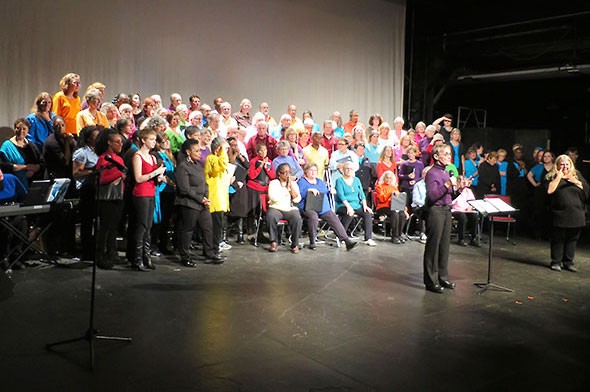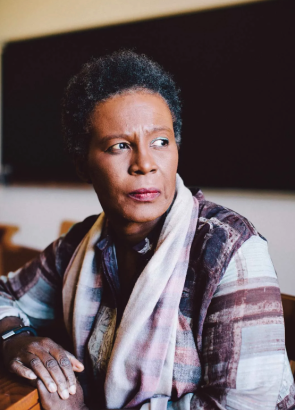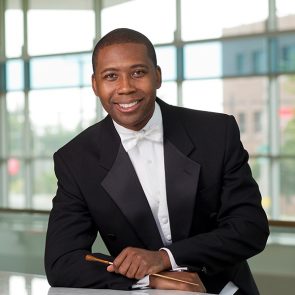
The World House Choir as the group appeared in 2015. (News archive photo)
World House Choir to perform ‘Weather: Stand the Storm’ at Foundry Theater
- Published: April 25, 2024
The World House Choir will return to its home stage in the Foundry Theater at Antioch College Friday and Saturday, April 26 and 27, to perform a program of music that includes the 20-minute choral piece “Weather: Stand the Storm.”
The piece was written by composer Rollo Dilworth, a music professor at Temple University, and sets to music the Claudia Rankine poem “Weather.”
Rankine, a well-known American poet, essayist, playwright and educator, composed “Weather” in response to the 2020 Minnesota murder of George Floyd by police, and the widespread protests of police violence that followed amid the global COVID-19 pandemic. The poem reads, in part:

Poet Claudia Rankine (Submitted photo)
“In extremis, I can’t breathe gives way
to asphyxiation, to giving up this world,
and then mama, called to, a call
to protest, fire, glass, say their names, say
their names, white silence equals violence,
the violence of again, a militarized police
force teargassing, bullets ricochet, and civil
unrest taking it, burning it down.
… We are here for the storm
that’s storming because what’s taken matters.”
World House Choir member Phillip O’Rourke told the News this week that, from a performer’s perspective, composer Dilworth’s music brings heightened immediacy to Rankine’s words.
“It really gives us a sense of being right in the middle of things,” O’Rourke said.
Performance notes accompanying the score for “Weather: Stand the Storm” written by Dilworth communicate that this was his intention; he writes: “After spending many hours studying the poem, I had to think very carefully about how I could employ tonal, rhythmic, stylistic and expressive elements that would amplify (and not detract from) such a powerful and multi-dimensional sequencing of words.”
Dilworth’s efforts to amplify Rankine’s words include a series of running themes throughout the music that make both tacit and explicit reference to George Floyd: interplay between the notes “G” and “F”; a tempo marking of 46 — Floyd’s age when he was killed; 27 measures in the piece’s introduction, 27 beats in the opening vocal phrase and the repetition of the words “I can’t breathe” throughout the song 27 times — the same number of times Floyd repeated the phrase to police as he was being forcibly restrained with an officer’s knee on his neck.
Dilworth also uses the melody from the spiritual “Stand the Storm” as a musical refrain throughout the work. He writes that the recurring theme is “quite fitting,” as Rankine’s poem “has a lot in common with the African American spiritual.”
“Both the poem and the spirituals speak of remembrance, resistance and resilience in the pursuit of social justice and social change,” Dilworth writes.
The piece’s performance notes also urge musicians who embark on performing “Weather: Stand the Storm” not to take the piece lightly, encouraging all performers and directors to “deepen their understanding about bias, racism, classism, sexism and other forms of marginalization.”
The World House Choir took Dilworth’s advice to heart; during the weekend preceding Martin Luther King Jr. Day, all 94 members of the choir undertook antiracism workshops led by former Coretta Scott King Center Director Shadia Alvarez.
“The workshops were really meant to get us to think about issues related to antiracism, diversity, equity and inclusion as we entered into beginning to work on this piece that has those messages,” World House Choir member Kevin McGruder told the News. “Sometimes you can learn a piece of music and not necessarily connect with the overall message. [Choir Director Catherine Roma] wanted to be sure that connection didn’t happen by chance, but in an intentional way.”
O’Rourke acknowledged that discussing the reality of racism in preparation for the performance was “not an easy conversation to have with a diverse people group.”
“We had to give our minds and our hearts and say, ‘OK, now let’s tackle this piece,’” he said.
O’Rouke added that “Weather: Stand the Storm” tonally and aurally mirrors the feelings and themes Rankine elicits in her poem. At one point in the piece, choir members repeatedly sing “Say their names,” and the audience is encouraged to respond by saying the names of Black Americans killed by police and white vigilantism.
“It’s an experiential piece,” O’Rourke said. “For the audience, it could be uncomfortable, because unrest is uncomfortable. But I also think there’s freedom and hope as you face it — I think that’s how Cathy directs and gives the piece momentum.”
Noting that both Rankine and Dilworth are Black artists, McGruder added that the value of work like “Weather” and the choral piece it inspired is that it “brings both the music and the message to new audiences and reminds people already familiar with what was happening in 2020 that that’s not past.”
At the same time, McGruder said, he’s interested in the themes represented in the choral work as “more than a performance.” He noted that “Weather: Stand the Storm” hearkens closely to classical music tradition in form — and classical music, as a genre with its historical roots in Europe, isn’t always welcoming to Black artists or audiences.
“There’s a certain audience this is going to attract,” he said. “As a Black man who played classical music in high school and college, I feel comfortable with this; but I do sometimes wonder if Black people — the people who are being victimized — I wonder if this music is for them.”

Composer Rollo Dilworth (Submitted photo)
McGruder added that this thought was not a criticism of the work of either Dilworth or Rankine. Rather, he said he hopes that Black artists working in traditionally Black genres of choral music, like gospel, can receive the same support and celebration as those working in white-dominant genres. He noted that “Weather: Stand the Storm” was commissioned by The College of New Jersey and a consortium of 21 other colleges and universities.
“Can we bring that same model to other types of music?” he said.
Nevertheless, McGruder said the choral work is “beautiful and exciting,” and encouraged audiences to come out and experience it for themselves.
“It’s an ambitious piece,” he said. “People are really going to enjoy it.”
O’Rouke echoed McGruder’s feeling, and added that he hopes “Weather: Stand the Storm” will leave echoes of community ringing in the ears of audience members as they file out of the Foundry Theater at concert’s end.
“It’s really about unity — that we really are going to make the biggest impact, no matter what it is, if we do it together,” he said.
“Weather: Stand the Storm” will be performed at 7 p.m. Friday and Saturday, April 26 and 27, at the Foundry Theater. The program will also include other choral works, as well as commentaries by Miami University musicologist Tammy Kernodle, at Friday’s performance, and by composer Rollo Dilworth, at Saturday’s performance. Admission is free, and donations are welcome.
The Yellow Springs News encourages respectful discussion of this article.
You must login to post a comment.
Don't have a login? Register for a free YSNews.com account.











No comments yet for this article.